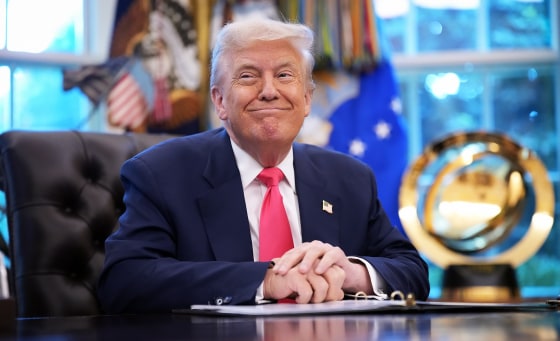As President Donald Trump’s second term stretches past its ninth month, the controversies are only stacking up. But whether congressional Republicans criticize the president or try to stay completely silent largely depends on one big factor: How will it affect a Republican lawmaker’s constituents?
In the case of Trump proposing to buy beef from Argentina, it was enough of a policy dispute — and enough of a blow to the constituencies of some GOP lawmakers — that many Republicans felt they had no choice but to speak out.
In the House, eight Republicans signed a letter questioning Trump, and many more publicly and privately signaled their opposition. It was a similar story in the Senate, where Republicans spent much of Tuesday posting online about their disapproval.
“If the goal is addressing beef prices at the grocery store, this isn’t the way,” Sen. Deb Fischer, R-Neb., wrote on X.

But a New York Times story on Tuesday that Trump is allegedly seeking $230 million from his own Justice Department was met with a far more muted Republican response.
Asked about the bombshell report on Tuesday night, Speaker Mike Johnson, R-La., said he hadn’t read the piece and, as a result, couldn’t comment.
But on Wednesday, with ample time to catch up on the news, Johnson demurred again when MSNBC asked him how comfortable he was with the president reportedly looking for a $230 million payout.
“I don’t know details about that. I’ve just read it,” Johnson told reporters Wednesday. “I know that he believes he’s owed that reimbursement.”
When Sen. Josh Hawley, R-Mo., was asked for his reaction to the story, he answered by deflecting to the recent revelation that the FBI analyzed his phone records, in addition to the phone metadata of almost a dozen other GOP lawmakers as part of the investigation into attempts to certify a different slate of electors on Jan. 6, 2021.
“What happened in the last four years with the weaponization of the Justice Department has to not only end, but never, ever happen again,” Hawley said, dodging the question about Trump seeking compensation. “Never happen again. And for that, there needs to be accountability.”
Sen. Ted Budd, R-N.C., said he didn’t know how Trump came to the $230 million sum, but he said it was “devastating how they weaponized” the DOJ against Trump.
Other Republicans — like Sens. Bill Cassidy, R-La., and Shelley Moore Capito, R-W.Va. — told reporters they hadn’t seen the story and therefore couldn’t comment, taking a page from Trump’s first term, when GOP lawmakers repeatedly insisted they hadn’t seen the president’s most recent controversial tweet.
“I don’t know what the story is yet,” Capito told MSNBC.
“Can I actually investigate that for my own and figure that out?” Cassidy asked reporters looking for a comment.

Of course, some Republicans expressed their discomfort.
In a statement, Rep. Don Bacon, R-Neb., told MSNBC that any potential restitution to Trump should be “handled via the courts to settle any legitimate claims.”
“This is a bad demand and is a money grab,” he continued.
Sen. Thom Tillis, R-N.C., said he had “a lot of optics concerns.”
“And I just don’t know if there’s precedent for it,” Tillis said. “It doesn’t seem to be.”
Notably, both Bacon and Tillis are retiring at the end of their terms.
But just about every other Republican who didn’t face a reporter on Wednesday elected to stay quiet. This story had nothing to do with local politics and everything to do with Trump. In that case, politically, it was best for Republicans to stay away.
In interviews with GOP lawmakers on Wednesday, Republicans suggested to MSNBC that it’s not some arbitrary decision about when they speak out; it all comes down to parochial responsibilities.
“I decide based on what I hear from my constituents,” Sen. Cynthia Lummis, R-Wyo., told MSNBC.
Lummis, who raised concerns about Trump’s Argentine beef proposal, said her constituents are worried about that issue.
The $230 million Trump wants from the DOJ? She “never heard about” it from folks back home.
According to Budd, he and other Republicans “look through the lenses of our state.”
Budd invoked the example of the ongoing recovery efforts in Western North Carolina, which was ravaged by Hurricane Helene.
“I want to make sure that those he’s appointed to his cabinet are actually doing that,” Budd said of addressing the recovery.
“It’s a more nerve-wracking proposition for them to go against Trump when it comes to something so close to his heart as his ability to shake down the U.S. government.”
Rep. Jamie Raskin, D-Md.
Democrats, however, told MSNBC the difference comes down to fear.
“When the cattle and beef industries in red states start to squeal, the Republican members of Congress respond, and they know that their own political longevity is tied to ensuring that their local constituents — the cattle and beef industry — are not obscured,” Sen. Ed Markey, D-Mass., told MSNBC.
But why sidestep on other matters, like questions of potential corruption in the Trump administration?
“They do not believe that there is an electoral price that they have to pay, and so they go along with the evisceration of constitutional protections,” Markey said.
Rep. Jamie Raskin, D-Md., told MSNBC that the GOP outcry over beef is an example of “herd instinct.”
“When some people begin to step out on an issue like Argentina, then it becomes safer for the other ones to do it, and generally it will be around an issue where they say they simply have to speak out because it’s so outrageous, it’s causing a problem in their district,” Raskin said.
“It’s a more nerve-wracking proposition for them to go against Trump when it comes to something so close to his heart as his ability to shake down the U.S. government,” he added.
Rep. Jared Huffman, D-Calif., told MSNBC that Republicans are “afraid of two things at once.”
“Trump’s wrath if they cross him badly, and their own voters who are rightfully pissed off right now over the Argentina bailout,” Huffman said. “That’s why they’re mostly silent, and when they do speak out, it’s on something like Argentina where their base is leaving them no choice and where Trump probably won’t end their careers over just this one thing.”
Other recent Trump scandals offer a lesson in how congressional Republicans navigate their criticism.
Trump’s commutation of the sentence of former Rep. George Santos, R-N.Y., for instance, was a delicate case. A number of New York Republicans wanted to express their frustration with Santos being excused from jail three months into an 87-month sentence, but they did so by focusing on Santos, not Trump.

“George Santos didn’t merely lie — he stole millions, defrauded an election, and his crimes (for which he pled guilty) warrant more than a three-month sentence,” Rep. Nick LaLota, R-N.Y., posted online, failing to mention who, with his signature, set Santos free seven years early.
Rep. Andrew Garbarino, R-N.Y., said in a statement that Santos had “shown no remorse” and that three months in prison “is not justice,” while also noting that President Trump has “discretion” to make such a decision.
When asked about the pardon, Sen. Mike Rounds, R-S.D., invoked his time serving as a governor. “I had a different approach to issuing pardons than what this president does,” Rounds said.
“But,” he said, “the president has that authority and the constitutional power to do so. Those are the facts.”
Whether Trump has the authority to pardon Santos was not the question — but Republicans have been acting as if that’s what everyone is asking, not whether it was an appropriate use of his power.
Another one of Trump’s controversial pardoning decisions came on the first day of his second term — when he pardoned or commuted the sentence of every Jan. 6 defendant, including those charged with violent crimes. That decision has recently drawn a new round of criticism after a pardoned Jan. 6 participant was arrested for allegedly threatening to kill House Democratic Leader Hakeem Jeffries of New York.
Asked Tuesday if the president made a mistake in issuing a blanket pardon, Speaker Johnson once again sidestepped the question, repeating a refrain he’s used frequently when asked about the latest Trump controversy.
“I don’t know any of the details of this at all. I don’t know who’s been alleged to have been involved in this,” Johnson said.
And he, like many other Republicans, was content to leave it at that.
